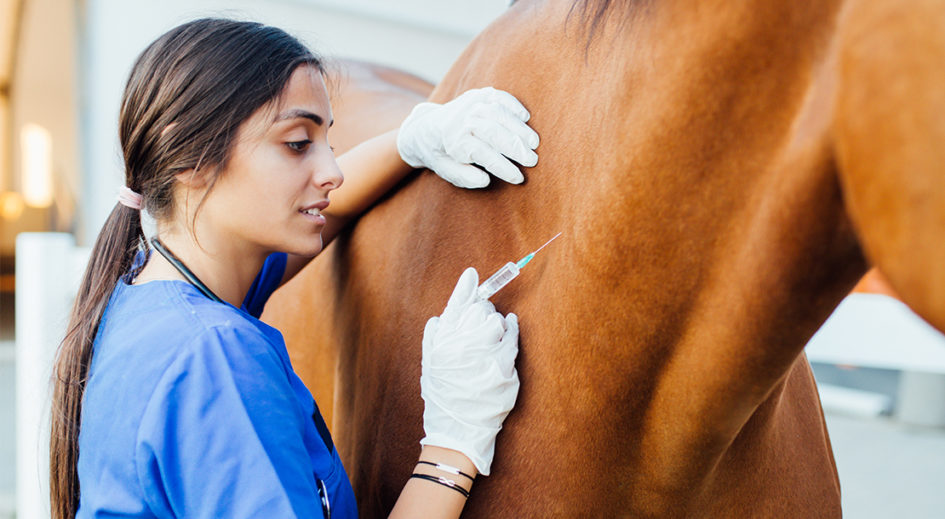Spring has sprung!…but does your horse have their spring vaccines? The warmer weather probably has you thinking of trail rides with friends or the horse show coming up. Before you head out, make sure your horse is up to date on its vaccines.
Core Vaccines
There are few worse feelings than seeing your horse sick and hoping the care and rest they are getting will be enough to help them feel better. We want you to be prepared, so we’ve broken down the 5 diseases that vaccines can help prevent.
1. Rabies
Rabies is a deadly virus spread to horses by saliva from an infected animal. Transmission is common through bites by bats, coyotes, foxes, raccoons, and skunks. The virus attacks the central nervous system and brain and can be deadly without timely treatment. It is best to vaccinate your horse yearly against Rabies.
2. Tetanus
Tetanus is a bacterial infection that affects the nerves controlling the muscles. As the infection continues to worsen it causes muscle stiffness and eventually can cause difficulty moving and eating. Horses can get this through everyday wounds or punctures they get in the field, making them very susceptible to this disease. The American Association of Equine Practitioners (AAEP) recommends vaccinating your horse yearly against Tetanus.
3. West Nile Virus (WNV)
West Nile Virus (WNV) is a virus spread by mosquitoes that causes fever and neurological issues, including stumbling, circling, hind limb weakness, and inability to stand. This virus can lead to death or prolonged symptoms. The AAEP recommends that your horse get vaccinated for the WNV every six months.
4. & 5. Equine Encephalitis (EEE/WEE)
Equine Encephalitis (EEE/WEE) is a virus spread to horses through mosquitos and it causes severe central nervous system disruption. It can cause paralysis, inability to swallow, muscle tremors, and death in 50-90% of horses that contract it. Horses should be vaccinated minimally every year. Boosters are encouraged every six months.
Risk-Based Vaccines
For horses that are traveling often, the 5 vaccines above may not be enough. Talk to your vet about the risk factors your horse may have. Let us break down the four diseases that can be caused by travel.
1. Equine Influenza
Equine Influenza is a highly contagious respiratory virus that is not ordinarily fatal but can cause severe pneumonia. If your horse travels often or attends large events, it is standard practice to vaccinate for this every six months.
2. Strangles
Strangles is a deadly contagious disease that causes horses to have severe head and neck swelling and nasal discharge and can obstruct breathing. If your horse travels often or attends large events, it is standard practice to vaccinate for this annually.
3. Equine Herpesvirus (EHV)
Equine Herpesvirus (EHV) is a worldwide, highly contagious virus that causes respiratory disease, neurological disease, abortions, and neonatal death. While there is no vaccine for the neurological form of EHV, you can vaccinate for the respiratory and abortion forms. It is very important to keep your horse protected in the event of an outbreak at a show or boarding facility. ArmourGuard RTU from Kinetic Vet kills EHV-1 in as little as 10 seconds and protects the area for up to 90 days!
4. Potomac Horse Fever (PHF)
Potomac Horse Fever (PHF) is a bacterial infection that causes colic, fever, laminitis, and even death. Horses can get PHF by grazing near or drinking from freshwater creeks that contain infected flatworms. If your horse lives near freshwater, it is best to vaccinate yearly.
Important Note: Talk to your vet before vaccinating and check with them periodically to ensure your vaccine schedule is still what your vet recommends. Also, tell your vet about any adverse reactions or concerns.
Shop Now
You can shop for vaccines and preventative care needs online at FarmVet.com 24/7 or call one of our friendly Sales Associates at 1-888-837-3626 from Monday-Friday 8am-5pm CST. You can also email your order to info@farmvet.com.
Vaccines aren’t the only important spring preventative care, don’t forget about deworming! Read about best practices HERE!


Leave a Reply